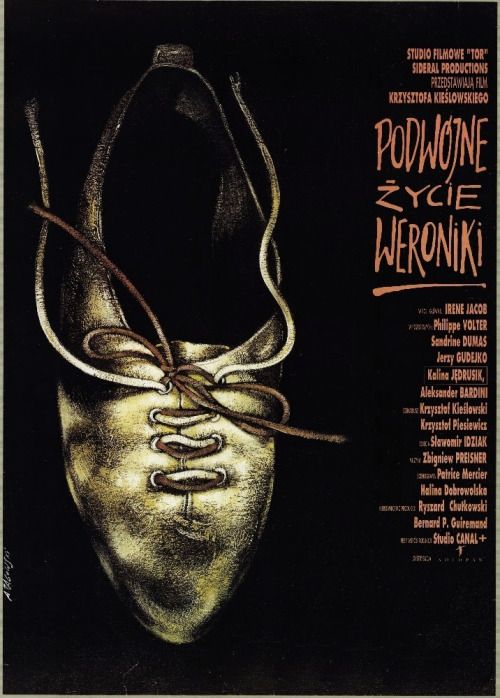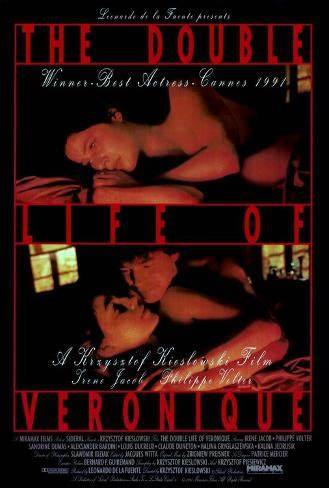 I’ve heard this 1991 French-Polish co-production called a profound exploration of identity in the modern world, and also a “two hour perfume commercial.” There are strong arguments to be made for both views.
I’ve heard this 1991 French-Polish co-production called a profound exploration of identity in the modern world, and also a “two hour perfume commercial.” There are strong arguments to be made for both views.
Certainly Poland’s late Krzysztof Kieslowski (1941–1996), who was following up his 1989 made-for-TV masterpiece DEKALOG, didn’t make things easy for himself. His primary aim with THE DOUBLE LIFE OF VERONIQUE (LA DOUBLE VIE DE VÉRONIQUE/PODWOJNE ZYCIE WERONIKI) wasn’t to tell a story (something the film doesn’t really possess) nor to make a political statement (although there is a definite political backdrop), but, rather, to convey a feeling.
Specifically, the film seeks to illuminate a peculiar sense of psychic dislocation–a sense that, in the words of the film’s initial protagonist Veronika, “I’m not alone in the world.” She’s a young singer living in Poland who suffers from a heart condition, which among other things causes her to collapse on a sidewalk bench one day (during which, in a bit of dry comedy worthy of Kieslowski’s fellow countryman Roman Polanski, a trench coat wearing man flashes her). Shortly after glimpsing a woman who looks exactly like her, who’s seen taking photographs and boarding a bus, Veronika’s heart finally gives out and she drops dead in the middle of an opera soliloquy.
Cut to Veronique, the Veronika lookalike glimpsed earlier. She’s a music teacher living in Paris who like Veronika has the feeling she’s not alone, although Veronique’s sense is a bit different: she feels like a part of her has died. She meets up with a guy who knew Veronika, and notices the picture she took of her double…and it’s around this point that Kieslowski abandons any pretense of drama, retreating into a purely aesthetic orientation (which the US version, containing a few extra shots included at the request of Harvey Weinstein, does nothing to reverse).
Art or self-indulgence? Truthfully I’m not entirely sure, although I can unreservedly praise the photography of Slawomir Idziak. As he did previously in episode five of DEKALOG (and its feature-length spin-off A SHORT FILM ABOUT KILLING), Idziak works extensively with color filters, creating a multi-hued visual landscape that often recalls Dario Argento (indeed, Veronika’s opera house death is not dissimilar in look and style to the delirious climax of the maestro’s OPERA).
Another plus is the luminous lead performance by the Swiss Irène Jacob, who as both Veronika and Veronique has a downright hypnotic screen presence. She became Kieslowski’s muse after this film, headlining his vastly acclaimed 1994 feature RED, although the performances delivered by Jacob in the years since Kieslowski’s demise range from passable (in MY LIFE SO FAR) to downright awful (in U.S. MARSHALS). Clearly Kieslowski brought out something in her that no other director has ever been able to tap, which also appears to be true of composer Zbigniew Preisner, a frequent Kieslowski collaborator who here provides a profoundly haunting and ethereal score whose transcendent power has yet to be repeated.
Yet as fine as Idziak, Jacob and Preisner’s work is, the film exists at an emotional remove from the viewer. It is, essentially, a museum piece, i.e. something to be admired rather than engaged with (much less enjoyed).
One more thing: THE DOUBLE LIFE OF VERONIQUE is notable for kicking off (deliberately or not) a slew of similarly mystically-tinged, albeit more plot based, female- centered doppelganger movies that spanned the remainder of the nineties, including DOPPELGANGER, ANNA OZ, SHATTERED IMAGE and SLIDING DOORS. Given that most of those films were failures, I’ll have to concede that Kieslowski’s aesthetic-based approach may have been the correct one.
centered doppelganger movies that spanned the remainder of the nineties, including DOPPELGANGER, ANNA OZ, SHATTERED IMAGE and SLIDING DOORS. Given that most of those films were failures, I’ll have to concede that Kieslowski’s aesthetic-based approach may have been the correct one.
Vital Statistics
THE DOUBLE LIFE OF VERONIQUE (LA DOUBLE VIE DE VÉRONIQUE)
Sidéral Productions/Le Studio Canal+
Director: Krzysztof Kieslowski
Producer: Leonardo De La Fuente
Screenplay: Krzysztof Kieslowski, Krzysztof Piesiewicz
Cinematography: Slawomir Idziak
Editing: Jacques Witta
Cast: Irène Jacob, Wladyslaw Kowalski, Halina Gryglaszewska, Kalina Jedrusik, Aleksander Bardini, Jerzy Gudejko, Janusz Sterninski, Philippe Volter, Sandrine Dumas, Louis Ducreux, Claude Duneton, Lorraine Evanoff, Guillaume de Tonquédec, Gilles Gaston-Dreyfus, Alain Frérot, Youssef Hamid
